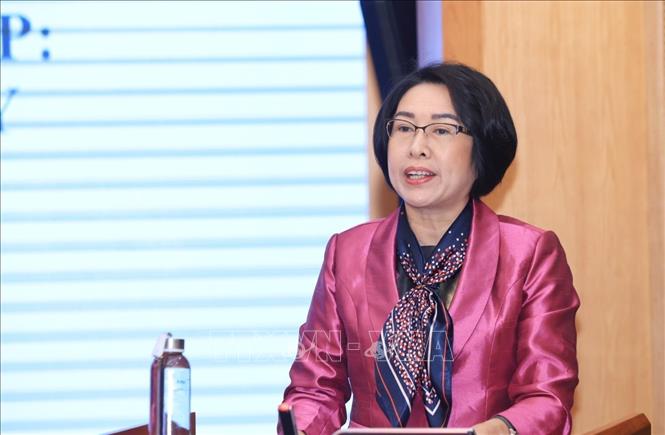
Ms. Tran Thi Hong Minh, Director of Central Economic Management Research Institute. Photo: Tuan Anh/TTXVN
“The return of the Resolution carries the message that improving the business environment is a priority task, demonstrating the level of care and companionship of the Government with the business community,” said Ms. Tran Thi Hong Minh.
According to Mr. Nguyen Minh Thao, Head of CIEM’s Business Environment and Competitiveness Research Committee, under Resolution 02/NQ-CP, before January 20, 2024, ministries, sectors, and localities must issue Programs and Action Plans. However, by the end of February, the Ministry of Planning and Investment had only received action plans from 16 out of 26 ministries, agencies, and 48 out of 63 localities.
“Organizing the effective implementation of the resolution is what businesses expect the most, and in which, the proactiveness and direct involvement of the leaders of ministries, agencies, and organizations play a crucial role in determining success,” expressed Mr. Nguyen Minh Thao.
From the perspective of businesses, Ms. Ly Kim Chi, Chairwoman of the Ho Chi Minh City Food Association, shared that the business community has high hopes for the resolution to fundamentally remove barriers and institutional constraints that are affecting the development of businesses in 2024. Therefore, Ms. Chi expects an improved investment and business environment, which would enhance competitiveness for businesses and contribute to economic recovery.
However, Ms. Chi also noted that in recent times, businesses have reflected that the reform of institutions and the business environment has been slowing down. Moreover, there are even additional unnecessary procedures in some sectors, making businesses face risks and possibly causing a decline in trust and business motivation… This is most evident in the first two months of the year, with nearly 62.98 thousand businesses leaving the market, while the number of businesses applying for new and re-entry registration is only around 41.09 thousand businesses.
Furthermore, there have been instances where major businesses in the food and beverage industry have merged or partnered with foreign enterprises and investment funds. For critical products affecting national food security, this shift is concerning.
“For the food and beverage industry, there should be a consistent, coordinated policy and legal framework from the Government to assist domestic businesses in reducing pressure when competing with these increasingly prevalent mergers and partnerships in the future,” suggested Ms. Chi.
The Chairwoman of the Ho Chi Minh City Food Association also believes that it is time to change the implementation method of reform, supplement monitoring mechanisms, and handle those in charge of implementing institutional reforms and improving the national business environment to achieve breakthrough results.
In reality, the responsibility of the leaders of ministries and sectors in implementing Government tasks assigned by the Prime Minister has not been specified, leading to many imperfect regulations that greatly impact businesses. Despite being instructed by the Government for many years, this situation has persisted and has not been thoroughly resolved.
Looking from the perspective of businesses, Mr. Dau Anh Tuan, Deputy Secretary-General and Head of the Legal Department of the Vietnam Chamber of Commerce and Industry (VCCI), said that the business environment has become more favorable with simplified paperwork, shortened processing time, more widespread electronic procedures, and timely revisions to regulations. There has been a strong decentralization spirit in administrative procedures.
However, the expectations of businesses under Resolution 02/NQ-CP are for higher quality, more effective, and substantial implementation. In Mr. Tuan’s opinion, some cutbacks and simplifications are still restricted to their forms and several cost calculations are imprecise. Numerous business difficulties raised have not yet been adequately considered. Besides reviewing and cutting existing regulations, there are indications that new barriers are being drafted. Businesses do not find it easy to access and participate in the review, reduction, and simplification of business regulations.
From the local perspective, Mr. Nguyen Phuong Bac, Director of the Economic and Social Development Research Institute of Bac Ninh Province, shared that in the context of increasing FDI capital flow into Vietnam, it is more crucial for ministries, sectors, and localities to allocate more time for business environment reforms, so that foreign investors’ projects can start production soon and continue to attract new capital inflows.

Workers at Samsung Electronics Vietnam Co., Ltd., Yen Phong Industrial Park, Bac Ninh Province at work. Photo: Thanh Thuong/TTXVN
To ensure the higher quality and effectiveness of the implementation of Resolution 02/NQ-CP, Mr. Tran Duy Dong, Deputy Minister of Planning and Investment, said that the Ministry of Planning and Investment will closely coordinate with ministries, sectors, localities, the business community, and relevant parties to promote institutional reform efforts. From there, a more liberal, favorable, and safe business environment will be established to facilitate quick transitions in economic recovery and development.
Deputy Minister Tran Duy Dong believes that the leaders of ministries, sectors, and localities need to have substantive dialogues and exchanges with the people and businesses, and solve the difficulties and obstacles faced by the people and businesses within their jurisdiction, rather than just listening.
“For ministries, sectors, and localities who have not issued programs and action plans to implement Resolution 02/NQ-CP, it is recommended that they promptly issue their plans and send them to the Ministry of Planning and Investment and the Office of the Government for consolidation and reporting to the Government and the Prime Minister. Specifically, action plans need to determine specific goals, tasks, and implementation timelines, as well as clearly assign responsibilities,” suggested Deputy Minister Tran Duy Dong.





![[Photo Essay]: Experts, Managers, and Businesses Unite to Forge a Path Towards Sustainable Green Industry](https://xe.today/wp-content/uploads/2025/07/z678592918-150x150.jpg)


![[Photo Essay]: Experts, Managers, and Businesses Unite to Forge a Path Towards Sustainable Green Industry](https://xe.today/wp-content/uploads/2025/07/z678592918-100x70.jpg)



